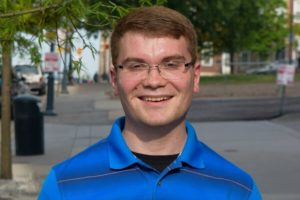With a degree in neuroscience and a job as a research assistant at The Johns Hopkins University School of Medicine in Baltimore, Oliver Avaritt had his life pretty well in order when he decided to hand it over to God and join the Dominican Friars of the Province of St. Joseph.
“A big draw for me was that their student brothers and priests were living an authentic way of religious life as envisioned by St. Dominic,” said Avaritt, a Georgia native and graduate of McDaniel College in Westminster.
As with many others, however, his ordered life is not a debt-free life, as he has a complication to negotiate before he dons the simplicity of religious life.
“It never used to be a problem,” observed Ted Daley of the Labouré Society, a Minnesota-based nonprofit organization dedicated to assisting those who wish to become religious or clergy pay off their student debts. “Now, it’s $60-, $70-, $80-, $100,000 dollars these grads have in student loan debt.”
By the time that is repaid, the debtor may have put his or her vocation aside, noted Daley, a former Minnesota state senator and veteran.
“We’re able to get them into formation so much sooner, and really save that vocation,” he said.
Rather than paying their debts directly, the Labouré Society offers aspirants coaching, structure, encouragement and strength in numbers as they raise the funds themselves. Aspirants are grouped into classes and, over six-month periods, work to raise $60,000 each, whether their individual debts exceed or fall short of that amount.
“Mine is lower, but when I reach $60,000, the money can go to help somebody else,” Avaritt said.
Because gifts made to individuals would not be tax-deductible, donors instead may give “in honor” of a particular aspirant.
Daley said the Labouré board undertakes a “comprehensive decision-making process” when distributing the total haul among aspirants; he noted it is sometimes possible for an individual to fall short of the $60,000 goal while putting in a quantifiably worthy effort.
Individuals spend between six and 18 months as Labouré aspirants, Daley said.
Avaritt’s class, which is fundraising through the end of June, has 23 members.
“This is a great way to really build up a culture of vocations,” said Avaritt, who has been writing to and meeting with potential donors and speaking at parishes, including his own, Ss. Philip and James Church in Baltimore.
Dominican Father David Mott, who completed his pastorship at Ss. Philip in James at the end of April, called Avaritt “a wonderful fellow.”
“I’m very thankful there is this Labouré Society, because the order can no longer afford – with all the vocations we’re getting – to pay off university loans,” he added.
He noted a “side benefit” of Labouré – as aspirants such as Avaritt visit parishes and reach out to friends, family and acquaintances to seek their donations and prayers, they simultaneously witness to the real possibility of religious vocations.
“People look at them and think, ‘Wow, this is a real person who is willing to make a sacrifice,’” Father Mott said.
Though raised Catholic, Avaritt truly immersed himself in the faith at McDaniel.
“I was eager to meet people and make friends,” he explained. “The campus ministers were some of the first to reach out to me.”
When he started attending Sunday Mass and dinners, he found that the outreach was beyond the superficial.
“They could challenge me,” Avaritt said. “I was skeptical about certain things, but they had good explanations.”
He also came to appreciate nearby St. John Parish in Westminster, and its then-pastor, Monsignor James P. Farmer.
“It was just seeing his great example of what it means to be a priest,” Avaritt said. “He’s very serious, but also very caring.”
As Avaritt’s junior and senior years unfolded, he found he had a vocation on his hands.
After graduation, he spent a year in New York in a voluntary discernment program with the Brothers of the Sacred Heart, and had his first interactions with the Dominicans.
He got to know them more at Ss. Philip and James, where he also became active with the Baltimore Frassati Fellowship, a young adult group hosted at the parish.
“I’m very happy about Oliver,” Father Mott said.
Dioceses and religious orders vary in their policies toward student debt. Father Mott noted that his order’s policy was driven by a recent surge in vocations.
“You’ve got men who are readers who fall in love with St. Thomas (Aquinas) – you hear that sort of thing constantly,” he said. “It’s difficult to say where they’re all coming from, because they come from everywhere.”
A candidate for the priesthood for the Archdiocese of Baltimore must pay down his student or other debt “to $0 to the best of his ability before entering into priestly formation with us,” vocations director Father James Sorra said in an email.
Father Sorra said that although the archdiocese will not accept a candidate who carries a large amount of debt, it does have a “limited capacity” to absorb debt from guaranteed student loans only. Although it fluctuates based on the financial capability of the archdiocese, the limit is usually about $20,000, he added.
Father Sorra said that although no candidates for priesthood for the Archdiocese of Baltimore have worked with the Labouré Society to date, the vocations office would be “very supportive” if a candidate with high student debt chose that avenue.
Thanks to the deferability of student loans, both the archdiocese and the Labouré Society have processes in place so they don’t end up holding the bag for candidates who decide to leave formation.
Daley emphasized that candidates’ work with the Labouré Society, which he called “so much more than fundraising,” is itself a kind of formation.
“It’s outside their comfort zone,” he said. “They are learning to answer God’s call in a way that stretches them.”
Email Erik Zygmont at ezygmont@CatholicReview.org.

